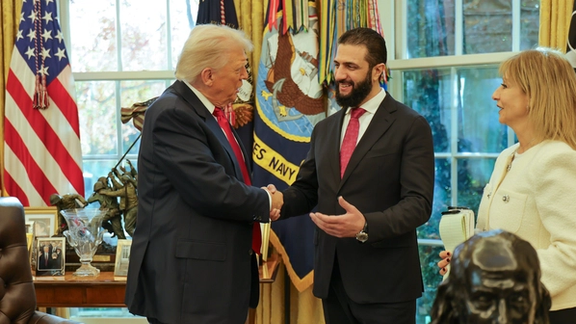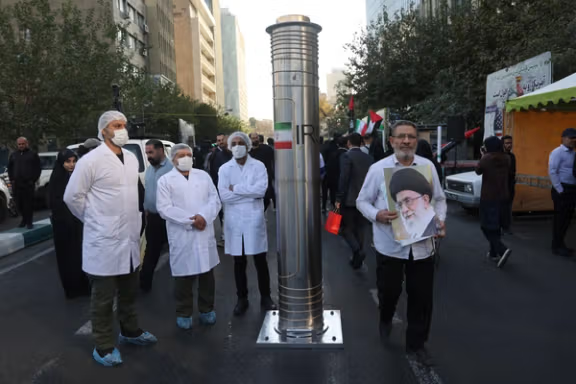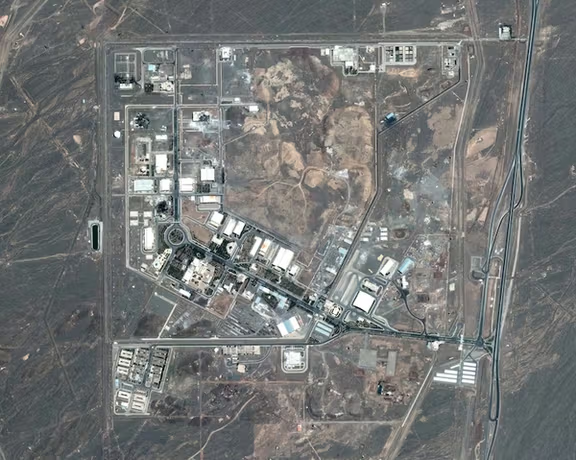US lifts some Syria sanctions, keeps curbs on Iran and Russia business

The United States on Monday suspended sanctions on Syria for 180 days except for certain transactions involving Iran and Russia, according to a statement by the Treasury.

The United States on Monday suspended sanctions on Syria for 180 days except for certain transactions involving Iran and Russia, according to a statement by the Treasury.
The announcement came as President Donald Trump hosted Syrian President Ahmed al-Sharaa at the White House for landmark talks, the first visit by a Syrian president to Washington.
The Treasury order replaced a May 23 waiver and effectively extends the suspension of some of the toughest US sanctions on Syria.
The department said the move signaled its "commitment to continued sanctions relief for Syria,” while maintaining restrictions linked to Iran and Russia.
"The suspension halts the imposition of sanctions pursuant to the Caesar Act except for certain transactions involving the governments of Russia and Iran, or the transfer of provisions of Russian-origin or Iranian-origin goods, technology, software, funds, financing, or services," the Treasury said.
The 2019 Caesar Act aimed at cutting financial support to the former government and entities tied to abuses during the civil war that began in 2011.
Sharaa’s visit marked a turnaround for the former Islamist commander who toppled longtime leader Bashar al-Assad, an ally of Iran, in December and has since sought to rebuild relations with Western and regional governments.
The White House meeting followed Washington’s decision to remove Sharaa from the US list of Specially Designated Global Terrorists.
A report by Reuters citing an unnamed US official said removing the remaining Syria sanctions, including the Caesar Act, would require congressional action, which the administration would support.

Iran-backed Shiite militias in Iraq are hoping victories in the parliamentary elections on Tuesday will deepen their sway, the Financial Times reported on Monday, in polls Tehran views as a boon to its flagging regional fortunes.
The Coordination Framework—a coalition of pro-Iran parties and factions within the Popular Mobilization Units (PMU)—have refrained from engaging in direct conflict with Israel since the October 7, 2023 Hamas attack.
Their low profile stands in contrast to Iran-aligned forces in Gaza, Lebanon and Yemen, which have taken a more confrontational stance.
This strategic restraint amid a broader regional conflict has enabled Iraqi militias to focus on domestic politics, the FT reported.
By avoiding escalatory drone or missile strikes that have drawn retaliation against Iran’s other allies, the militias have preserved their operational strength—transforming potential battlegrounds into electoral strongholds.
“Iraq is both a historic ally and a cash cow for Iran. What [Tehran] wants is a stable Iraq to ensure money flows to them and their allies,” the Financial Times quoted an unnamed source familiar with internal political dynamics told
Key figures within the Coordination Framework—including leaders from Asa'ib Ahl al-Haq and Kata'ib Hezbollah - are leveraging their roles in the fight against ISIS and their involvement in post-war reconstruction to appeal to voters disillusioned by corruption and economic stagnation, the daily reported.
Strategic restraint
Citing internal documents and interviews, the FT reported that the coalition plans to contest up to 150 of the 329 parliamentary seats in the November 11 elections. A strong showing could allow them to shape the next government and secure control over key ministries such as defense and interior.
With Hezbollah suffering heavy losses in Lebanon, Hamas weakened in Gaza and Bashar al-Assad ousted in Syria, Tehran’s influence has reined, likely making Iraq an important venue for its regional outreach.
The lack of confrontation as the region was hit with heavy fighting, the paper reported, may indicate that Iraqi factions are prioritizing their economic privileges.
“Forget Iran and forget ideology: the factions are now playing with major money and they’re afraid to lose it either by getting bombed or sanctioned,” the FT quoted a senior Iraqi Shia politician close to militia groups as saying.

Israeli intelligence agency detained a 27-year-old man in Tel Aviv on suspicion of collaborating with Iran's intelligence services, allegedly in exchange for cryptocurrency payments to film various public locations, local media outlets reported on Monday.
Israel's Shin Bet security agency and police said an investigation into the suspect's communications and laptop devices revealed his alleged outreach to Iranian operatives via social media.
He initiated contact, Ynet and i24 news outlets cited security sources as saying, received assignments and was compensated financially in return.
The suspect who was detained last week, was instructed to film several public sites in the Tel Aviv area including the Tel Aviv Museum of Art, Avramovitch Park in the Bavli neighborhood, and the site of a recent missile impact in Ramat Gan, according to the agencies' statement.
The locations are primarily suburban and public spaces with no direct access to military or intelligence facilities, though Ramat Gan is a densely populated suburb east of Tel Aviv that has been targeted in recent rocket and missile attacks.
Ongoing cases
Israeli prosecutors on Sunday indicted a 23-year-old hotel worker from Tiberias on charges of spying for Iran, marking the latest in a string of espionage cases connected to Tehran over recent months.
This incident underscores a growing wave of espionage prosecutions linked to Iran, as Israeli security agencies have warned that Tehran has ramped up recruitment of Israeli citizens through social media platforms like Telegram—particularly since the onset of the Gaza war in 2023.
The case comes amid heightened tensions following the 12-Day War in June, a brief but intense direct conflict between Israel and Iran. In response, both Iran and Israel have escalated counter-intelligence measures.

Iran’s foreign ministry has channeled much of its political and diplomatic capacity into strengthening regional alliances and supporting what it describes as ‘axis of resistance,’ Minister Abbas Araghchi told parliament on Monday.
“By strengthening the Axis of Resistance and supporting unity-building movements across the Islamic world, the ministry of foreign affairs has devoted a significant portion of its capacity to providing political and diplomatic backing for the Resistance Front,” he said.
The term "axis of resistance" is used by the Islamic Republic to describe a network of allied groups in the region, including Palestinian militant organizations, Lebanon’s Hezbollah, several factions in Iraq and Syria, and the Houthi movement in Yemen.
Araghchi told the lawmakers that the foreign ministry’s activities over the past 14 months have followed four main strategic tracks.
According to him, the first, focused on security diplomacy, covers deterrence, defense, and resistance coordination. The second on economic and development diplomacy, including “resistance economy” initiatives. The third centered on building regional influence and the fourth was aimed at shaping ideas and narratives through think-tank, public, and media diplomacy.
He described recent months as a period of intensified confrontation involving the United States and Israel, citing assassinations and airstrikes across the region, including attacks on Hamas and Hezbollah figures, as justification for increased diplomatic engagement.
"Under these circumstances, a significant portion of the Foreign Ministry’s efforts has been devoted to supporting the axis of resistance, effectively functioning as the foreign ministry of the axis."
Western governments have renewed pressure on Tehran to engage in direct talks not only over its nuclear and missile programs, but also its continued backing of armed groups across the Middle East.
They argue that Iran’s support for militias in Lebanon, Iraq, and Yemen fuels instability in the region.
Iran’s diplomatic agenda, Araghchi said, also sought to build a “multipolar order,” defend national sovereignty, and counter Western sanctions through cooperation with blocs such as the Shanghai Cooperation Organization, BRICS, and the Non-Aligned Movement.

Iran’s nuclear program has reached a dangerous stalemate after the 2015 deal’s expiry, collapsed talks, and lack of oversight – raising regional fears of a renewed clash with Israel, New York Times reported.
According to the Times, US strikes earlier this year failed to eliminate Iran’s enrichment capacity, and uncertainty remains over the location and scale of Tehran’s stockpile of highly enriched uranium.
Analysts cited in the report warned that the lack of diplomacy or inspection access leaves both sides on alert, with Israel signaling readiness to act again if Iran moves closer to a weapon capability.
The Times said Iran has refused inspectors access to new underground enrichment sites such as “Pickaxe Mountain” near Natanz nuclear site and continues to face renewed United Nations sanctions and severe economic pressure.
Regional powers are urging restraint and fresh negotiations but acknowledge little progress as Tehran and Washington exchange blame over the failure of talks.
The International Atomic Energy Agency told the Financial Times last week that most of Iran’s enriched uranium stockpile appears to have survived the conflict but cannot be verified without access.

Iran’s underground missile and ammunition facilities withstood the 12-day conflict and US strikes thanks to two decades of hardening and design, said Iran’s passive defense chief in an interview with the Story of the War podcast on Saturday.
“Almost all underground and under-mountain missile infrastructure remains intact and has no serious problems,” Gholamreza Jalali said, crediting long-running operational measures and engineering choices.
The priority given to aerospace and missile assets, Jalali said, guided 20 years of planning for missile cities and depots built into mountains and deep underground. Only minor repairable damage occurred at some access points, he added.
Underground networks and nuclear sites
Sensitive nuclear centers, Jalali said, were placed in safe spaces after early threat assessments, adding that he personally proposed the protected design concept years ago.
“The shadow of war was present from the very beginning of our activities, and based on the threat scenarios, it was decided that sensitive nuclear sites should be designed in secure underground locations beneath mountains.”
During the 12-day war and the US attacks on nuclear facilities, added Jalali, some foreign reports highlighted the confrontation between “bunker buster bombs” and Iranian concrete engineering. “It was an oversimplified interpretation of designs."
“Regarding the US claim of destroying nuclear facilities, it must be said that further details remain classified and confidential,” he added.
Banks cyber security not addressed yet
Jalali pointed to cyber-attacks on Iranian banks, saying two major banks shared a core platform with unresolved weaknesses. “For banking security, we designed a regional secure model and obtained funding, but execution rests with the relevant bodies,” he said.
During the June conflict, Iran’s Bank Sepah and Bank Pasargad were hit by major cyberattacks that disrupted online banking and ATM services.
Jalali also addressed the use of foreign messaging platforms by military figures, saying none of Iran’s commanders, living or dead, had ever used WhatsApp, while reports suggested some Hamas leaders had relied on it.
Advanced surveillance and data-analysis systems – spanning artificial intelligence, satellites, and signal tracking – are fully controlled by Israel and the United States, he said, adding that using such platforms exposes communications to monitoring and targeting.
“When we are in confrontation with such adversaries, we must assume total visibility across digital space.”
Former communications minister Mohammad Javad Azari Jahromi said in August that Iranian officials with sensitive information on their phones were easy targets for Israeli cyber operations during June's 12-day war, adding that Israel exploited platforms such as WhatsApp to track them.
“In the recent war, those who had information and were of interest to Israel were easy prey for hacking,” Azari Jahromi said, but did not identify those targeted.
Shelters kept confidential
Tehran has multiple shelter options, including metro stations, car parks, and basements, but officials avoided announcing them publicly to prevent panic, he added.
Local authorities received training to guide people in emergencies, while Tehran Municipality was working to upgrade facilities and warning systems for possible use as public shelters, according to him.

Iran had fully expected attacks on its nuclear facilities and launched a plan to prepare, he added.
Limited drills in Kashan and broader exercises at Fordow, Natanz, and Isfahan helped minimize risks, Jalali said, adding that chemical storage was cleared and activities scaled back before strikes, and post-attack tests confirmed no radioactive contamination.